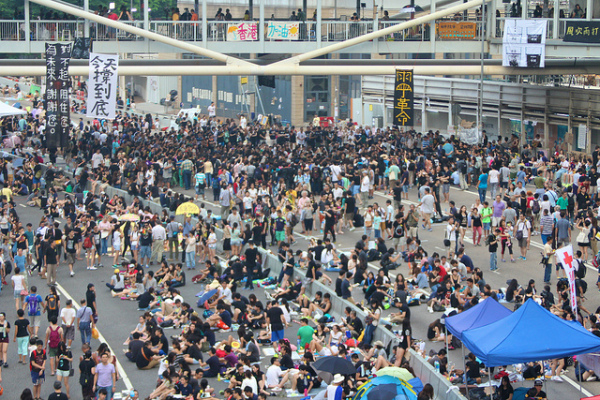Hong Kong’s pro-democracy revolution is characterized by this powerful hashtag. I’m not a big fan of hashtags, but this one is different. And this post is long overdue. Some catch-up if you’ve been ignoring the news, and some musings after the jump.
With a name derived from the umbrellas used to protect protesters from tear gas and pepper spray on September 28 and storms on days since, this revolution is a fight for the right to elect their leader. And it is being led by students and joined by Occupy Central for Peace and Love and the people of Hong Kong. They are asking China to make good on a promise they made to the SAR (Special Administrative Region) that Hong Kong could have free elections in 2017, that they could have a “high degree of autonomy” in the first fifty years after the handover from Great Britain in 1997.
The protesters are asking to democratically choose their next elected leader in 2017, rather than elect one from a pre-selected pile of candidates that Beijing approves of. They are asking for Chief Executive Leung Chun-ying to step down. They are NOT looking for complete sovereignty from Beijing, nor asking for more than what had been agreed on at earlier stages in this long and complex play between the mainland and Hong Kong.
And they are finding their voice. Thousands more joined protests last Monday after the police used tear gas and pepper spray, feeling that this violence was not a part of our Hong Kong. Peacefully and continually, protesters have blocked key roads, taken over Admiralty on Hong Kong Island and Mong Kok on Kowloon side. And people around the world are showing their solidarity for the protest, physically, digitally, mentally, internationally. International news media outlets keep honing in on how the protesters are even picking up their trash, a seemingly unheard of phenomenon. Meanwhile, mainland Chinese outlets are disparaging or keeping quiet. Instagram was shut down in China the night of the tear gas-enabled police crowd control.
Yet China holds tight to its position: no. Beijing issued statements that they fully back the Chief Executive who many argue has been a tool of mainland politicians seeking greater clout and control in Hong Kong. Some parties in China and Hong Kong believe the protesters can simply be waited out, that they will diminish in number and support. Just minutes before a deadline set by the protesters, Hong Kong officials and Leung Chun-ying agreed to engage in limited talks with protesters, but a solution remains distant and his degree of sincerity is unknown. Violence has broken out between anti-Occupy and Occupy protesters.
But here’s the important thing: the beast is out. And I mean that in the best way. I don’t even mean it in an aggressive way.
As I’ve watched this unfold thousands of miles away, it’s not just about the zillions of news articles being published as the world watches and waits. It’s about a wave of change that is more than a night spent on the street. I am watching a Facebook feed full of my friends and former students in Hong Kong as they fight for their vision for their home. As they learn a new vocabulary, language, and confidence for expressing their politics. Even those hitting class deadlines or who are currently studying abroad send their solidarity and raise awareness in their new universities.
Though some students are already experienced in conversations and protests about the future of Hong Kong, after an attempt by Chinese authorities in Beijing to change Hong Kong’s curriculum, others are new to it. 17-year-old Henry Chui told South China Morning Post: “I’ve never joined in these things before – I’ve never even been to a protest. But I really want to show support [this time].” A professor expressed pride in his students boycotting class.
A sense of community is emerging, as is a reinforced Hong Kong identity. A 20-something wrote: “Hong Kong is our home, and it has been treated as such by Occupy….The demands are simple, we want to be able to manage our own house, and manage it in the way we were repeatedly promised we would be able to. But for years, those promises have been unfulfilled and at times broken, I am proud to see so many thousands of people out on the streets asking with peace and love for promises to be kept and obligations respected.”
Hong Kongers are in it for the long haul. Joseph Cheng Yu-shek, a political science professor at the City University of Hong Kong told newspapers: “All the protesters here and Hong Kong people know it is extremely unlikely the Chinese leaders will respond to our demands. We are here to say we are not going to give up, we will continue to fight on. We are here because as long as we fight on, at least we haven’t lost.”
And as David Schelsinger notes:
No matter which actually happens, a generation has been politicized, a city has found a consciousness, and Hong Kong has displayed an identity separate and distinct from its colonial past and its Chinese nationality. That in itself is a huge change, a tremendous accomplishment, and a factor Beijing and the world will have to acknowledge. And for Hong Kongers themselves, no matter how this ends, their lives will forever be defined by the questions: “Where were you in September and October 2014?” And “what did you do for our city?”
I no longer live in Hong Kong, but I am encouraged by the energy and the commitment of HKers. It is more than a yellow ribbon in a Facebook profile picture. This is about how and who will shape the future of Hong Kong, about what civil disobedience means, about exercising your rights. About sparking new conversations and creating alternate visions. Do you hear the people sing?
Image Credit: Flickr








